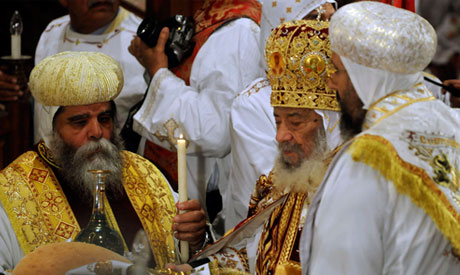 Shortly before 9pm on Saturday, dressed-up men, women and children solemnly trickled in through the main entrance of St Mark's Cathedral on Cairo's Ramsis Street to attend this year's Coptic Easter mass. Two dozen police officers were already stationed near the gates, while an army tank stood in the distance flying an Egyptian flag.
Shortly before 9pm on Saturday, dressed-up men, women and children solemnly trickled in through the main entrance of St Mark's Cathedral on Cairo's Ramsis Street to attend this year's Coptic Easter mass. Two dozen police officers were already stationed near the gates, while an army tank stood in the distance flying an Egyptian flag.
Pope Shenouda's absence dampens spirits at Coptic Easter in Egypt
By-Ahram
Copts and Poliltical Islam
00:04
Tuesday ,17 April 2012

Church guards, who traditionally greet visitors to the mass with a smile, were largely quiet as they checked congregants' wrists for their tattooed crosses or asked for identification cards.
The sombre scene outside the church was a far cry from the avalanche of humanity that had amassed at its premises only one month ago to bid late Pope Shenouda III a final farewell.
A massive, 40-metre-long banner bore the late pope's image and words attributed to Jesus Christ: "I came here for you. And I left here also for you."
The banner was suspended from the dome of the abbey in which the mass was held, reminding visitors of what most already knew – that this would not be a happy Easter for Egyptian Copts in the absence of their beloved pope.
Inside the main hall, all the elements necessary for the mass were on hand, while a 50-strong church choir – dressed in bright red and white garb – turned out a steady stream of hymns.
Dozens of journalists, photographers and television cameramen took up positions in all corners of the church, while several VIPs filled the first row of pews.
The latter included presidential hopefuls Amr Moussa and Ahmed Shafiq, both of whom came to pay their respects. Notably, the two rivals did not greet one another as they entered the church, choosing to sit on opposite sides of the aisle.
Coptic Bishops in shiny costumes, meanwhile, recited prayers, lit candles and burnt incense around the altar.
Dozens of Ethiopian Coptic worshippers, dressed in traditional East African cotton gowns and headscarves, sat among the Egyptian women seated on the right side of the hall.
Men from the Egyptian countryside dressed in long Galabiyas, along with teenagers wearing t-shirts bearing the late pope's image, repeated hymns and bible verses while sitting on benches on the left side of the abbey.
Congregants could be seen turning their faces intermittently to see who was who.
Most of those present did not seem particularly worried about a possible repeat of the terrorist attack that left dozens dead at Alexandria's Two Saints' Church on New Year's Eve 2011. After all, no major attack on a Coptic church has taken place since May of last year.
"The mass is beautiful, but it's half empty. It's not the same as in past years – the pope isn't here," 30-year-old Hanna, a factory worker, told Ahram Online.
Indeed, many in the crowd – which did not exceed a thousand worshippers, roughly one third of the cathedral's capacity – remained seated during the entire mass. Many held their heads in their hands as they struggled to hold back tears.
The sedated audience briefly came alive when Interim Pope Bakhomious strode down the aisle dispersing incense on his way to the altar – but the mood quickly returned to one of melancholy.
At this point, as if sensing that the small crowd needed a reminder of how different Easter was for Egypt this year, Bishop Yohanna read a short eulogy for late Pope Shenouda.
"Remember, thy Lord, the pope who served his people and your people," he said. "Place him in heaven with our saints Abraham, Isaac and Jacob."
Shortly afterward, an altar boy placed a framed picture of the pope on the seat on which the late Shenouda had sat for three days in March, immediately after his death, while he bid farewell to his beloved congregation.
A young priest then read aloud from the Acts of Paul: "Eat and drink all you want and all the time, if you do not actually believe that the dead will be resurrected."
Following the conclusion of the mass, a twenty-something volunteer guard told Ahram Online: "No, we didn't expect the place to be either full or happy. He was like our real father. Would you want to celebrate anything if your father died?"
Outside the cathedral, as congregants filed out, a Coptic woman in her 60s stared down a group of about 30 young people who held up signs across from the main gate.
"Are they demonstrating against us?" the woman, dressed in mourning-black, asked a young man also leaving the church.
"No," he responded. "They're members of the Abdel-Moneim Abul-Fotouh presidential campaign wishing us happy holidays."
One colourful poster read, "We wish you a happy festivity."
Another poster bore one of the late pope's most memorable quotes: "Egypt isn't the homeland we live in – it's the homeland that lives within all of us."


